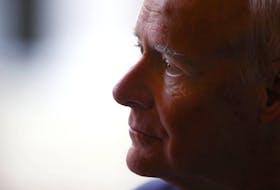Drew Dorweiler is suspicious of everything and everyone each time he travels to mainland China on a business trip.
The managing director of Montreal-based boutique investment bank IJW & Co. Ltd., is often assigned either interpreters or hosts to help him out during his trips. In most cases, they’ll offer him a personal phone that he can use to reach them at any time. But he avoids using them.
“You don’t know who’s listening,” he said.
Dorweiler is just as suspicious when he’s approached in the street or a bar by someone who seems a little too friendly. They tell him they want to practice their English, but is that really the case or is there another reason?
Why is it that they’re pushing to have dinner together only five minutes after meeting him? The conversation will take multiple turns, with the last one being when they ask what he thinks about Hong Kong or the Chinese government.
That’s his cue to leave.
“It’s best to walk away and keep your mouth shut,” Dorweiler said. “Anyone that has done business in China, the precautions you’re taking there, are now extended to Hong Kong.”
Canadian companies that operate in or visit Hong Kong will have to consider adopting a similar attitude after China passed a security law that experts say will result in the end of Hong Kong as the west knows it.
The language in the law’s 66 articles is wide ranging: it applies to citizens, non-permanent residents and, apparently, visitors as well. It criminalizes what it deems to be acts of secession, terrorism, subversion or collusion with foreign forces. Those accused might face extradition to Beijing, where their trials could be heard behind closed doors.
Beijing has already opened an office in Hong Kong where its agents will be enforcing the security law.
The law is a “death knell” for Hong Kong, according to Arne Kislenko, a Ryerson University professor and national security expert.
Kislenko, who also handled Canadian national security cases as a senior immigration officer, warned that businesses will need to take extreme precautions to continue conducting business in Hong Kong.
The primary change will be to ensure that none of their employees being sent to visit have any history of making pro-democracy or anti-China statements. One such tweet or Facebook post could be enough to be found in violation of the new law.
Chinese intelligence officers may even already know that a visitor has made such comments before they arrive at the airport, Kislenko said.
“Be really careful about who’s representing your company and be well aware you’re very likely, if not absolutely assuredly, under surveillance,” he said. “This is a country that knows exactly what’s going on all the time and monitors everyone all the time.”
That monitoring includes directly spying on Canadian companies operating in Hong Kong and business travellers, Kislenko said.
Companies in Hong Kong should expect China to be listening to their phone conversations, hacking their computers to watch online activity and it may even be placing agents posing as employees inside their offices, he said.
Part of preparing for a trip to Hong Kong involves imagining the worst-case scenario, which, for Kislenko, is understanding that there’s a possibility employees end up like Michael Kovrig and Michael Spavor, two Canadians who were detained in mainland China in 2018.
Canada’s federal government has issued the same warning in a travel advisory for Hong Kong, writing online that Canadians “may be at an increased risk of arbitrary detention on national security grounds and possible extradition to mainland China.”
It’s still early, but it doesn’t appear as if companies linked with Hong Kong, Canadian or otherwise, are keen to discuss the new law.
Andrew Work, a Canadian entrepreneur who has been living in Hong Kong for 24 years, said he’s aware of a few business association reps who have already changed their policies because of the new law.
“No one knows where the boundaries lie, so the safest way to avoid crossing them is to say nothing,” Work said.
The Financial Post sent multiple enquiries to a variety of companies, from business owners who have smaller manufacturing links in the city to giants such as Manulife Financial Corp. and Sun Life Financial Inc. that employ hundreds of people there, and the responses were scant.
For now, the national security law doesn’t change much for IJW, beyond stretching its protocols for mainland China to Hong Kong. Business travel is all but impossible due to COVID-19 restrictions, but Dorweiler is keen on making the trip as soon as he’s able.
“I don’t have anything to fear,” he said, adding that Canadian companies who leave Hong Kong because of the new law may open up additional opportunities for his company. “We don’t talk politics and don’t bad mouth the people running the show.”
Two potential outcomes of the law may change his mind, Dorweiler said.
One is if business completely dries up, although he doesn’t think that’s likely because the city’s Hang Seng Index is up more than 1,000 points since the law was passed. The other is if China begins detaining more visitors, specifically in Hong Kong. Until then, IJW is in a holding pattern of sorts, he said.
Work, executive director at Self Storage Association Asia and owner of New Work Media, which operates Hong Kong’s Harbour Times newspaper, also has no plans to leave. He and his wife just renewed the lease on their apartment for an additional two years.
But he’s already seen some changes in how companies are conducting business. He said that he recently spoke with a representative of a company that no longer wants to sign international contracts under Hong Kong law, preferring Singapore instead.
Hong Kong may no longer have the same competitive business edge it once had, but Work is not ready or willing to leave just yet. It’s the one place in Asia that’s like Canada, where immigrants can feel like they belong. They can live in Japan for 20 years and never be Japanese, he said. The same goes for South Korea.
“I don’t want to give up,” he said.
Financial Post
• Email: [email protected] | Twitter: VicF77
Copyright Postmedia Network Inc., 2020







